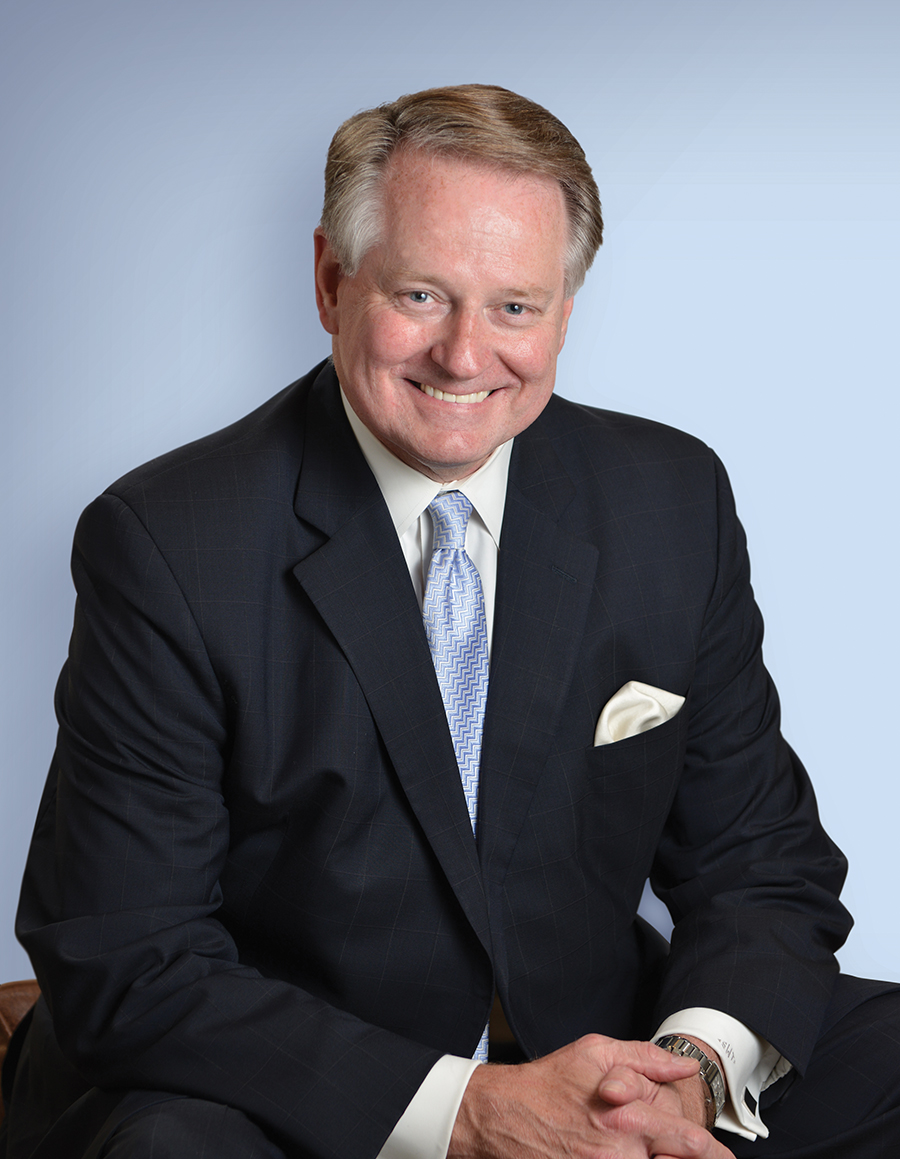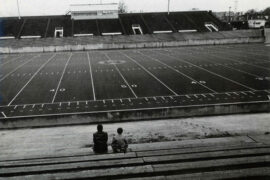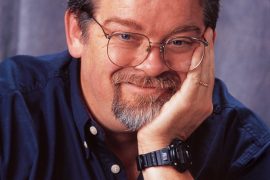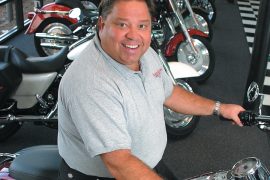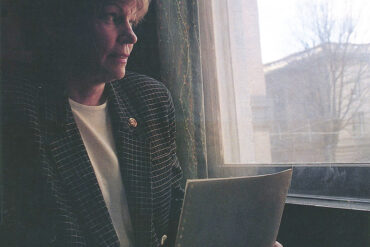Huntington Mayor Steve Williams has his eyes set on one goal: to transform the city of Huntington.
By Katherine Pyles
HQ 88 | WINTER 2015
Mayor Steve Williams does not use the word “transform” lightly. As a member of the Young Thundering Herd from 1974-1978, playing football in the years following the Marshall plane crash, he speaks firsthand about how a single night transformed an entire university. With warmth in his eyes, he says his life was transformed on June 23, 2001, the day he married Mary Poindexter. And when he says he wants to transform the city of Huntington, he means it.
“During my campaign in 2012, a reporter asked me, ‘What will you do if you lose?'” Williams recalls. “My response surprised me. My competitive nature should have come out and said, ‘I’m not going to lose.’ But instead I said, ‘My mission is not to be mayor of the city. My mission is to transform the city.’ I knew that if I lost, of course I would be disappointed, but it would mean there was something else I was supposed to do for Huntington.”
Fortunately for Williams – and, as many would say, for the city of Huntington – he did win the 2012 mayoral election. Two years into his term, Williams is pursuing his mission with passion, focus and energy, proving himself to be “the right person at the right time” for the job.
“Steve has a plan, and he is getting people to buy into that plan – and I am confident that it has great potential for the betterment of our community,” says renowned businessman Mike Perry, who has known Williams since 1982 as a mentor, supporter, former boss and friend. “It is the culmination of all of his life experiences and training. Over the years Huntington has made a lot of progress, but it has been slow. Steve is mayor at exactly the right time to accomplish the things needed to take us into the future.”
Although Williams has been in the public eye as long as he can remember, his path to the mayor’s office was long, circuitous and, at times, uncertain.
Born in Bluefield, West Virginia, to Clara and the late Don Williams, leadership is in Williams’ blood. His mother began teaching at the age of 18 in a one-room schoolhouse in Mercer County and went on to teach at Bluefield State College, serve as principal at Pipestem Elementary School and, when the family moved to Huntington, teach at Highlawn Elementary, Miller Elementary and Cammack. His father, known throughout southern West Virginia as “Big Don,” coached football and track at Concord College for 14 years and is a member of the Concord Athletics Hall of Fame. While there, Don Williams led the football team to two WVIAC championships and had the state’s first all-weather track built.
“Everybody knew ‘Big Don,'” Williams smiles, “and I was ‘Big Don’s boy.'”
As children, Williams and his younger brother Marc enjoyed the familiarity of growing up in Athens, West Virginia, a town of 900 people.
“I was riding my bike once and got in a wreck, and I tore myself up,” Williams says. “When I got home, I saw Mom standing there in the driveway with bandages. Someone saw me and called her, and there she was, waiting on me.”
Williams started playing sports when he was 7 years old. A year-round schedule of football, basketball, track and baseball proved to be a perfect match for the high-energy young boy who once climbed up his fireplace in an attempt to “fly off like Superman.” Without a football program in Athens, Williams transferred to nearby Princeton, where he earned the position of starting quarterback and defensive back. He lettered in football, basketball and track as a sophomore.

“Dad always said the quarterback needed to be the first on the field and the last to leave,” Williams says. “He would say, ‘Create your own luck. Work harder than everyone else.’ There was a certain work ethic that was expected of my brother and me. There was an expectation of leadership.”
That work ethic is what inspired Don Williams to retire from coaching in 1969 and begin to work on his doctorate at Virginia Tech. He completed the three-year education administration program in just 15 months. When he left Concord, “Big Don” received a call from Marshall, offering him the offensive coordinator position with the Thundering Herd. He declined – a decision that may have saved his life. Just months later, on Nov. 14, 1970, a tragic plane crash took the lives of 37 football players on the Marshall University Thundering Herd football team, along with five coaches, two athletic trainers, the athletic director, 25 boosters and a five-member flight crew.
“My brother and I were at home watching TV on the night of Nov. 14,” Williams remembers. “It came scrolling across the TV that there had been a plane crash. Mom and Dad were at a party, and they came rushing home. I’ll never forget it.”
Williams, age 14 at the time of the crash, never thought that in just four years he would be playing at Marshall. In 1972, Dr. Robert Hayes, then-dean of Marshall’s College of Education, recruited Don Williams to be a professor in the Department of Physical Education and head track coach. The Williams family moved to Huntington, and life for the young boy called “Stevie” would never be the same.
“We moved here in 1972, and the love affair began,” Williams says with a proud smile. “I fell in love with this town and how it embraced me. Even today, I feel like I’ve been here forever. Huntington is home to me.”
Williams loves to tell the story of the “pretty girl with long dark hair and big brown eyes” that came to visit his home soon after he arrived in Huntington. Mary Poindexter, along with 10 other girls, stopped in to meet “the new guy.”

“Mary was the first girl I met in Huntington. We went out once, and it took 22 years for her to go out with me a second time,” Williams jokes. “It just goes to show I’m persistent.”
Williams played football and basketball and ran track at Huntington High, the school he credits for first recognizing his writing ability. As a senior he was voted “Most Courteous” and named Athlete of the Year.
“I took creative writing from Mrs. Helen Browning, and I learned from her that I had a gift for expressing myself through the written word,” he says. “I was on the debate team, and that’s where I learned I was comfortable with the spoken word, too.”
Don Williams would go on to become chair of the Department of Health, Physical Education, Recreation and Dance, where he would establish degree programs in athletic training and sports administration and eventually earn a spot in the Marshall School of Medicine Hall of Fame for his work to advance the sports medicine program. His two sons both attended Marshall. Steve was awarded membership in the Omicron Delta Kappa leadership fraternity and graduated with honors in 1978, going on to earn a master’s degree in public administration from WVU. Marc was the Marshall student body president, graduated with honors in 1982 and went on to earn his J.D. from the WVU College of Law.
Steve Williams played football during all four of his years at Marshall and started for three of those four years.
“I have a connection with those players, and a connection with those killed in the crash, that will never go away,” says Williams, who wears a green bracelet inscribed with “NEVER FORGOTTEN” on his right wrist 24/7. A framed photograph of the 1970 football team hangs on the wall behind his desk in the mayor’s office at City Hall. “Our city was taken to its knees in such despair and grief after the crash, and we wondered if we’d ever recover. But the crash reminds us even to this day that when we come together, we can accomplish anything that we set our minds to. It’s a reminder of what we have overcome and what we can achieve.”
Williams’ first job after completing graduate school was an internship under Richard Barton, city manager of Huntington at the time. Five years later, in 1984, Williams became the city’s director of economic development. Later that year, he was named the youngest city manager in Huntington’s history, serving in that capacity until Huntington switched to a strong mayor form of government in 1985. From 1987 to 1994, Williams represented Cabell and Wayne counties in the West Virginia House of Delegates, where he played an active role in higher education and medical education reform. In 1993, he ran for mayor but lost to his Republican opponent Jean Dean – a devastating experience that he says he thanks God for every day.
“At that time it was about the lowest point I had ever known,” Williams says. “I realized that I was in it for the wrong reasons, that I had lost my way and my purpose. I had to separate myself completely from politics as a result; it just hurt too much. But I’m so thankful that I did. I left public life and began a new chapter, and that’s when I found Mary.”
During his absence from politics, Williams focused on his career in investment banking and investment brokerage. As a senior level executive in both Huntington and Chicago, he oversaw many of the key markets for the largest banking institutions in the nation. It was during his business career that the pretty Southside girl he met as a teenager reentered his life.
“Mary and her girls, Nikki and Laura, saved my life,” Williams avows. “I found my way back to the man I knew I was, the man I was raised to be. I wanted to be the type of man who would honor them.”
In 2001, after a six-year courtship, Mary Poindexter became Mary Williams.
“I’m the luckiest man in the world,” Williams says. “Mary keeps me grounded and helps me see what’s important in life. She just has this delightful way about her that leaves everybody feeling that they are the most important person in the room. That’s the way she makes me feel every day.”
Mary Williams works for Huntington dentists Dr. Jim Butler and Dr. Nika Hettlinger, but she is more widely known for her acting abilities. She has performed locally as well as in Cortland, New York, where she was awarded “Best Actress in a Play” in 2013 by BroadwayWorld Central New York.
Williams says Mary helps him improve his public speaking and coaches him when he needs it. And one morning in 2012, he needed her coaching considerably. Williams had been contemplating running for mayor, and it was Mary who finally convinced him to seize the opportunity, the very day he was required to submit his name.
“How are you going to feel tomorrow morning and every morning after that if you decide not to run?” she asked her husband on an early morning walk with their dogs Beau and Gus. “Will you regret this for the rest of your life?”
A member of City Council since 2008, Williams felt it was time for a new direction for Huntington – one not tied to a particular party or agenda but rather one that involved strong leadership and earnest collaboration.
“When I was on City Council, it became more and more apparent that the things I had been learning in business needed to be applied in the day-to-day operations of our city,” he says. “What I saw was a city on a proper path but going at a trajectory that was too low and too slow. We had brilliant people running our departments, but it didn’t seem that they had the leadership they needed. I had a clear vision of what we were capable of and where we could go.”
So, armed with his political and legislative knowledge and decades of business experience, Williams hit the campaign trail with the slogan “Expect an Exceptional City.” And this time felt much different than the first.
“He had learned his lesson,” says Perry, who supported Williams’ campaign both in 1993 and 2012. “This time he went door to door. He went to all of the meetings he could. He became a man of the people.”
On the night of the election, Williams did not throw a party. That was something he did in 1993. Instead, he gathered with a few close friends and had a prayer as the polls were closing.

A few hours later, Williams found out he had won the election.
“The last 21 years – from the moment I lost the mayor’s race in 1993 to the journey I went on after that – have brought me exactly to this point,” Williams acknowledges. “It is humbling. If anyone had told me 10 years ago that I’d be the mayor of Huntington, I would not have believed it. I thought I had forfeited my opportunity. I feel like this is what I was meant to do.”
Williams hit the ground running as mayor. In March 2013, Williams and City Council rescinded the city’s 1 percent occupation tax that was the subject of a 2011 lawsuit. In the following months, Williams organized a citywide cleanup effort that focused on graffiti, high grass in lawns and litter and furniture marring personal property. In July 2014, he worked with other city officials to find funding to hire 10 new police officers. He has supported efforts to breathe new life into the Central City area and the Fairfield community and is currently working to bring a riverfront development to Harris Riverfront Park. His initiatives are diverse, but they share a common goal of improving the city – replacing a mantra of “that can’t be done” with “let’s work together and find a way.”
“There is something for us to do on every street corner,” Williams says. “If we just talk to each other and work together, we can find a way to get things done.”
He has rekindled the city’s partnership with United Way in its efforts to better the Tri-State, says Laura Gilliam, executive director of United Way since 2005.
“We met with Steve about our annual community campaign, and he put together a plan to visit every city department himself to educate employees on the work that we do,” Gilliam says. “We’ve always had a relationship with the city in the past, but since his leadership as mayor it’s been tremendously accelerated. The city employees’ giving to our community campaign went up 400 percent under Steve’s leadership. Our goal at United Way, which we share with the city, is to make this a better place to live, work and play. Steve sees collaborative work as a way to address community problems, as do we.”
He has worked to preserve the historic Keith-Albee theater with longtime friend and colleague David Tyson, co-president of the Keith-Albee Performing Arts Center.
“I’m really proud of the job Steve is doing to transform our community into a better place,” says Tyson, who laughs that working with Williams is as fun as arguing about politics with him. “He is completely hands on. He is very, very bright. But most importantly, he is passionate in his love for Huntington. I can’t imagine anyone that would be a better mayor of this town than Steve Williams.”
Williams has initiated collaboration between the Huntington Police Department and Marshall Athletics via a ride-along program that allows Marshall athletes to see the perspective and hard work of our police officers – and vice versa. He has also dedicated his time to the university as a whole, hosting monthly “Coffee with the Mayor” events on Marshall’s campus to reach out to students.
“Since his election as mayor, I have had the privilege of working, collaborating and partnering with Mayor Williams on initiatives to achieve shared goals on behalf of the greater Huntington community,” says Dr. Stephen Kopp, president of Marshall University. “He is an outstanding leader and visionary and a true son of Marshall University. We share a common commitment to the betterment of our respective communities and the people we serve. We both recognize the interdependent linkages between the future of our university and the future of our city – realistically, they are one and the same.”
Williams’ most far-reaching collaborative effort is the “Call to Prayer” that began as a simple request to area ministers and quickly spread across the world as his video message went viral.
Through his support of The Healing Place of Huntington, an addiction recovery center, Williams saw time and time again the crippling effects of drug addiction on members of the Huntington community. As mayor, he had received far too many heartbreaking emails from local residents asking him to save their neighborhoods and their children from the growing drug problem. And when he participated in a SWAT raid with area police, he realized the dangers of drug addiction for law enforcement.
“I kept hearing that there was no ‘silver bullet,’ that you need education, enforcement, treatment and recovery,” Williams says. “But I wasn’t hearing anyone talk about faith.”
Williams asked local leaders and ministers a “what if” question that has since become famous.
“I taped a video to be emailed to Christian clergy in the region because it would have been impossible for me to reach all of them in a one-on-one conversation,” he says. “In turn, I held face-to-face conversations with the leadership of the local Jewish congregation as well as the leadership of the local Islamic congregation – and individuals who consider themselves secularists with no particular religious affiliation.”
Williams says he “just threw the question out there.”
“I asked, ‘What if we could get all the churches, congregations and people of faith together to agree on a given Sunday at a given time to offer prayer for the healing of those who are addicted and the protection of our law enforcement?’ I got an immediate response. It surprised me. Each congregation and countless individuals participated. Whether through prayer, meditation or another type of thoughtful reflection, we all joined together, focusing our combined energy on our city and the problems it is facing.”
Williams’ friend Joe Murphy of Trifecta Productions was overseeing a commercial video shoot on a hot August day, and Williams asked for a few minutes of time between takes to record his plea to local churches.

“I just spoke into the camera what had been on my heart,” Williams says. “Everything I had learned about the drug problem in our city just poured out. I know there are people fighting addiction right this second and people who have lost their lives because of addiction. I know families are being torn apart. But I also know the power of prayer.”
On Sept. 7, at 11:05 a.m., churches and congregations of various faiths across the city, nation and even world stopped their worship services for a prayer. They prayed for the safety of law enforcement and first responders as they protect the streets of Huntington from drug-related crime. They prayed for healing for those battling the evils of addiction. They prayed for delivery from a life of crime for the drug dealers. Williams, a member of both Trinity Episcopal and Fifth Avenue Baptist churches, joined his own church families in prayer that morning.
“We structured our service so that the time of prayer could begin at the same time as all the other churches,” says Dr. Allen Reasons, senior minister of Fifth Avenue Baptist Church. “At 11:05, a few members of our congregation stood in their pews and started ringing bells to signal the call to prayer. Members of our church whose families had been touched by addiction came forward and offered prayers for the different groups affected. As Steve’s home church, I felt it was important for us to pray for him as well. Humbly, he did not ask for those prayers – but he is leading our entire city in its fight against addiction, and he needs our prayers.”
Reasons says Williams is a man of deep faith and the kind of worshipper every minister hopes to have.
“From the pulpit each week, I can tell by his facial expressions and responses that he is listening, that he ‘gets it,'” Reasons says. “I know his faith. I see it lived out in the way he serves God through his church and in his decisions. As his pastor and friend, I can say that he fulfills his job as mayor with the kind of integrity and character that you would hope would thrive in each public office.”
Since Sept. 7, stories of addiction recovery have been celebrated, law enforcement victories have been acknowledged and local nonprofit organizations that fight addiction have found renewed support.
Williams’ belief in the power of prayer is accompanied by a belief in hard work, something that was engrained in him as a young boy and reinforced during his business career.
“When I started out in investments, I was in a small market competing against people in the largest markets in the country,” Williams says. “I figured out that if they were going to work an eight-hour day, I was going to need to work a 12-hour day. I learned how to fit 18 months of work into 12 months.”
Williams brought that work ethic with him to City Hall, where he puts in 80 hours or more each week.
“People wonder how we get so much done so quickly. That’s how. We’re putting in the time,” he says. “It’s a work ethic that is necessary for us to compete in a world market.”
With future plans including free citywide Wi-Fi access and the redevelopment of the ACF Industries property, Williams doesn’t have any intentions of slowing down in the second half of his term.
His friends, who have watched his rise to fame, departure from politics and return to city leadership, are confident in his ability to guide the city into the future. Williams has brought together diverse groups for a common good – transforming the city of Huntington into the exceptional place it has the potential to be. Perry says the timing is right for Williams, and the timing is right for his city.
“Steve didn’t become mayor to enhance his obituary,” Perry says. “He wants to better the community that has been good to him. He starts early and works late. He gives us hope and he gives us courage that will help us take on some of the hard things that are ahead of us. He has unbridled energy and enthusiasm, and I’m so proud of him. He is the right person at the right time.”
As for Williams, he is simply grateful for the opportunity.
“I’m so blessed to be able to realize the purpose of everything that I experienced up to this point,” he says. “Since we moved here on Aug. 7, 1972, I can look back and say that everything in my life has led me to be able to do what I’m doing in office. Other people will judge whether I’m the right person at the right time – all I know is I’m having a ball. I can’t imagine doing anything else.”

